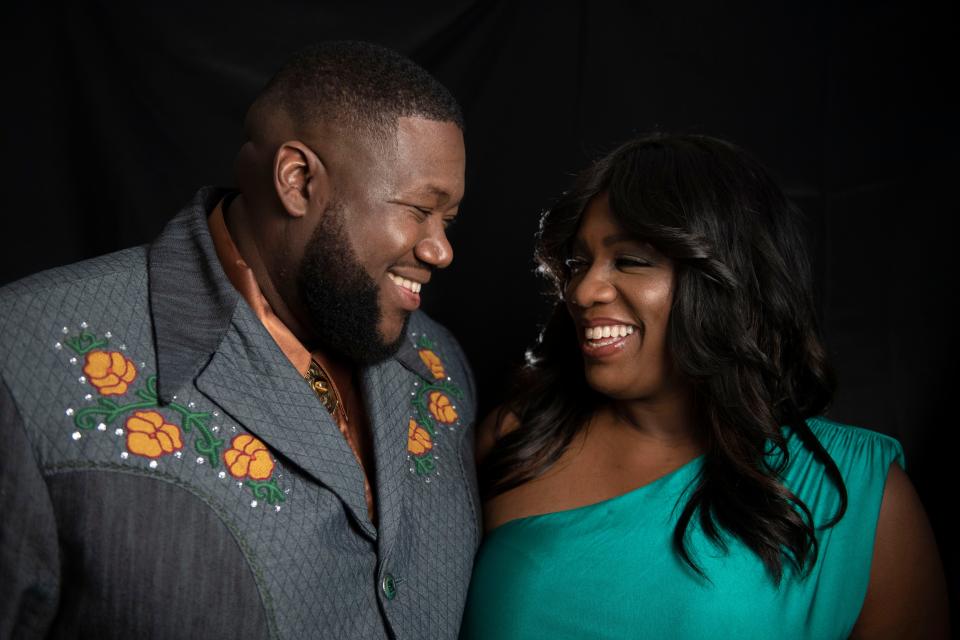Can you submit yourself for a Grammy? Who votes? We can answer all your Grammy questions
Nick Autry, a Nashville-based producer, songwriter and engineer and general manager at Sound Stage Studios on Music Row, grew up watching the Grammy Awards on television and said he never in a million years thought he would ever be part of the process.
For the last decade, he has been a voting member of the Recording Academy, which means each year he gets to vote on who he thinks should receive a Grammy Award.
"When I was a kid that seemed like a million miles away," he told The Tennessean. "Back then I didn't even realize people voted for those awards."
Autry has voted on the main categories (Record of the Year, Song of the Year, etc.) as well as the genres he has expertise in such as country, blues and Americana.
"Those main categories are something I spend some time with," he added. "My kids were arguing over who I should vote for. I want them to be able to see the process, too. I went with what I thought was right and we were in agreement on a couple of them."
With the 66th Grammy Awards happening Sunday, Feb. 4, we thought it would be fun to take a look at the entire process, from how someone is nominated for a Grammy to how the winners are chosen. We consulted with Ruby Marchand, the Recording Academy's Chief Awards & Industry Officer, for a little 101 on how an artist comes to be a Grammy winner. Here's what we learned:
1. Any 'eligible' recording can be submitted for Grammy consideration by a Recording Academy member
There are a few criteria that render a song or album eligible for Grammy consideration. It had to be released during the product eligibility period for entries, which this past year was between Oct. 1, 2022 and Sept. 15, 2023. The work also has to be available on at least one digital service provider such as Spotify or Apple Music. It has to be submitted by a member of the Recording Academy or media company that released material during the eligibility period. In some cases, artists or creators submit their own work if they are Academy members.
"We open up our online entry process, or our 'OEP' which might seem like just a database, but actually, it’s the start of a dream. The start of a journey," Marchand said. "There is a place within our 94 categories for so many people who have chosen a life in music to shine. By the end of OEP, we may have somewhere in the range of 16,000 qualified entries. Then the work really begins."

AI in music?: Here's how artificial intelligence is showing up in Nashville songwriting rooms
Future Grammy winner?: Grace Bowers is the teenage guitar phenom who plays dive bars at night
2. Submissions go through genre screening committees
Once submissions are received, hundreds of people in the music industry come together through the academy's genre screening committees to "very thoughtfully and collaboratively do a lot of listening," Marchand explained.
"Based on the definitions of our categories, their job is to come up with whether or not the each of these entries have been placed in the proper categories or not. There are close to 350 experts who participate in that."
During the screening process, members of the screening committee execute a thorough review and evaluation of all submissions, ensuring that they are categorized properly. The committees are are made up of artists, genre experts, songwriters, producers and musicologists.

3. Only voting members can cast a ballot
The Recording Academy has three memberships: voting members, professional members and Grammy U, which serves as a gateway to the music industry for anyone ages 18-29 pursuing a career in music. While all members participate, only voting members get to cast their vote.
"Creators who are integral to the recording process can apply to be a voting member," she said. "That means their contribution to recording would be considered critical. Because we are a peer-based organization, it is the peers who are in the studio or the peers who are contributing to the recording. They are the ones invited to vote. That’s the unique distinction between the two. The voting members vote and the professional members do not."
The Recording Academy currently has roughly 11,000 voting members across all genres.
"The first round of voting is pretty exciting because you get to vote for all kinds of stuff," Autry added. "Everything any of us work on is there. It's an enormous field of records. I always look forward to see who is going to be nominated for best producer and best engineered album because there's usually a few people I’m friends with in there. Sometimes it’s hard to not vote for your friend but I really do always try to vote for the best product."
This year, Autry was involved with one record that ended up with a nomination: Brandy Clark for Best Americana Album.
Did he vote for Clark in that category?
"Oh, I always vote for myself," he said with a laugh.

4. The Recording Academy doesn't know the winners until everyone does
Once the first round of entries are voted upon in the first round of balloting, all votes are tabulated by the accounting firm Deloitte. Marchand said the Academy never sees the results of the voting ballots because the go directly to Deloitte, who then reveals who the actual nominees are.
Next comes the final round of voting, which ended Jan. 4.
"Those results are revealed to all of us the day of the Grammy telecast," she said.

5. The bulk of the 94 Grammy Awards are given out before the live telecast
There is an entire four-hour show-before-the-show that has a host, performers, presenters who will hand out upwards of 80 Grammy Awards. Called the "Premiere Ceremony," this portion of the Grammy Awards is livestreamed at live.grammy.com, but not broadcast live on CBS.
The Grammy Awards telecast is broadcast live from Crypto.com Arena and will air live on CBS and stream on Paramount+. The live broadcast will feature live performances and roughly 10 Grammy Awards will be handed out. The host of the 2023 Grammy Awards is Trevor Noah.

6. For 2024, there are three new Grammy categories
When the Grammy Awards were held for the very first time in 1959, there were 28 categories. This year there will be 94 with the addition of the Best African Music Performance, Best Pop Dance Recording and Best Alternative Jazz Album categories.
"All three are brand new and all created for this year’s 66th awards," Marchand said. "It's going to be really exciting to see who will be the first set of winners for these three categories."
Melonee Hurt covers music and music business at The Tennessean, part of the USA TODAY NETWORK — Tennessee. Reach Melonee at [email protected] or on X @HurtMelonee.
How to Watch:
What: 66th Annual Grammy Awards
When: Sunday, Feb. 4
Where: Premiere Ceremony 3:30 p.m. ET at the Peacock Theater in Los Angeles. Live stream at live.grammy.com and the Recording Academy YouTube Channel. Grammy Awards telecast 8 p.m. ET live from Crypto.com Arena in Los Angeles. Watch live on CBS or Paramount+.
Grammy Awards By the Numbers:
There are more than 900 total nominees for the 66th Annual Grammy Awards.
370 are first-time nominees.
Nearly 16,000 eligible entries were submitted for Grammy consideration in 2023.
There are 94 categories being awarded at the 2024 Grammy Awards.
3 new categories have been added to this year’s Awards: Best Alternative Jazz Album, Best Pop Dance Recording, and Best African Music Performance.
There are more than 11,000 Recording Academy voting members who get to vote during the Grammy Awards process.
Roughly 80 categories are announced during the Grammy Awards Premiere Ceremony, and the remaining categories are announced during the live telecast on CBS.
This article originally appeared on Nashville Tennessean: Grammy Awards 101: Everything to know about the awards, ceremony, more
